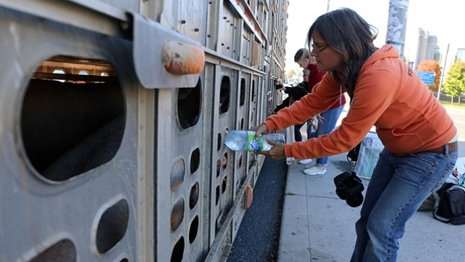Farm representatives are frustrated after attending day five of Anita Kranjc’s trial
By Jennifer Jackson
Farm industry representatives watched in frustration as animal activist Anita Kranjc was back in court for her trial.
The Halton police charged Kranjc with mischief after she gave water to slaughter-bound pigs in June 2015. Tuesday marked day five of the trial.
Several concerned farm industry representatives gathered in the Burlington courtroom to witness the trial, according to CBC.
The farm reps feel that the trial lost focus from the real issue, and that this focus needs to be directed back to Kranjc’s mischief charges.
"It's mischief," Henry Swierenga, a representative for the Ontario Federation of Agriculture, said to CBC. "It's a mischief charge. That's why we're here. To stand up for the farmer" and stand against "the actions perpetrated on his vehicle."
According to Bruce Kelly, environmental program lead for Farm and Food Care Ontario, there is no place for tampering in our food system.

Anita Kranjc
Photo: CBC
"It's essentially a misdemeanour case about product tampering," Kelly said to CBC.
Halton police said they had no way of knowing if it was water that Kranjc offered to pigs.
Lori Marino, an American neuroscientist, spoke in front of the court for the defense about the intelligence of pigs, and animal cruelty in agriculture. Marino displayed a video of pig cruelty in an Australian slaughterhouse.
In regard to the video, “my first thought this morning was why are we talking about something from not only outside of the province, but outside the country?" Paul Bootsma, field services manager with the Christian Farmers Federation of Ontario and a former pork producer, said to CBC.
Kranjc faces a maximum sentence of six months in jail, and a $5,000 fine in this case.